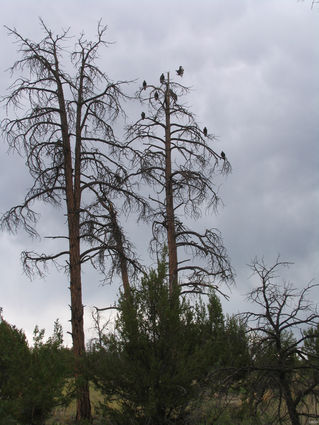Climate Change to Cripple Southwestern Forests
Trees Face Rising Drought Stress and Mortality as Climate Warms

Drought and climate change are causing extensive forest dieback in the U.S. West as well as worldwide. These photos show dead ponderosa pines in the Jemez Mountains of New Mexico killed by a combination of drought stress and attacks by bark beetles on weakened trees. Photographer: Craig D. Allen, USGS.
LOS ALAMOS, N.M. — Combine the tree-ring growth record with historical information, climate records, and computer-model projections of future climate trends, and you get a grim picture for the future of trees in the southwestern United States. That’s the word from a team of scientists from Los Alamos National Laboratory, the U.S. Geological Survey, University of Arizona, and other partner organizations.
The research, published in Nature Climate Change this week, concluded that if the Southwest is warmer and drier in the near future, widespread tree mortality likely will cause substantial changes in forest and species distributions.
The researchers aligned some 13,000 tree core samples with known temperature and moisture data, further blending in historical events such as documented megadroughts that drove the ancient Pueblo Indians out of longtime settlements such as those at Mesa Verde, Colorado.
By comparing the tree-ring record to climate data collected in the Southwest since the late 1800s, the scientists identified two climate variables that estimate annual southwestern tree-growth variability with exceptional accuracy: total winter precipitation and average summer-fall atmospheric evaporative demand. Southwestern U.S. forests grow best when total winter precipitation is high combined with a summer and fall that aren’t too hot or too dry.
Findings that summer-fall atmospheric evaporative demand is just as important as winter precipitation have critical implications for the future of southwestern forests. “Atmospheric evaporative demand is primarily driven by temperature,” said A. Park Williams, the study’s lead researcher. “When air is warmer, it can hold more water vapor, thus increasing the pace at which soil and plants dry out. The air literally sucks the moisture out of the soil and plants.”

These trends, the researchers noted, are already occurring in the Southwest, where temperatures have been generally increasing for the past century and are expected to continue to do so because of accumulating greenhouse gases in the atmosphere. There still will be wet winters, but increased frequency of warmer summers will put more stress on trees and limit their growth after wet winters, the study said.
Will future forest drought-stress levels reach or exceed those of the megadroughts of the 1200s and 1500s?
Using climate-model projections, the team projected that such megadrought-type forest drought-stress conditions will be exceeded regularly by the 2050s. If climate-model projections are correct, forest drought-stress levels during even the wettest and coolest years of the late 21st century will be more severe than the driest, warmest years of the previous megadroughts. The study forecasts that during the second half of this century, about 80 percent of years will exceed megadrought levels.
The current drought event, which began in 2000, is a natural case study about what to expect from projected climate scenarios. While average winter precipitation totals in the Southwest have not been exceptionally low, average summer-fall evaporative demand are the highest on record.
And trees, Williams says, are paying the price. The team concluded forest drought stress during more than 30 percent of the past 13 years, including 2011 and 2012, matched or exceeded the megadrought-type levels of the 1200s and 1500s megadroughts. The only other 13-year periods when megadrought-type conditions were reached with such frequencies in the past 1,000 years were during the megadroughts themselves.


Reader Comments(0)